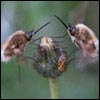Until the middle of the sixties Phytomyza atricornis Meigen was considered one of the most common and polyphagous Agromyzidae. However, a revision by Griffiths (1967a) made it clear that by that name two closely related species are covered: Chromatomyia syngenesiae (Hardy) en Ch. horticola (Goureau). The difference is visible only in interior details of the male genitalia: neither the females nor pre-imaginal stages can be identified with certainty. Unfortunately, both species are common and polyphagous. There is some difference in foodplant preference. Ch. syngenesiae lives almost exclusively on Asteraceae, while horticola has been found on at least 24 families of flowering plants, with a marked preference for Asteraceae, Brassicaceae and Fabaceae. Both species share a clear preference for human-dominated, disturbed habitats, and are found most frequently in urban situations.
For the practical identification of mine material some choose to use the old, collective, name atricornis for both species. A somewhat more precise approach is to identify material from Asteraceae as “cf. syngensiae”, and material from non-Asteraceae as horticola.
[Chromatomyia sp.] mine sur Laiteron
Animateurs : latique, Bruno48, Tifaeris
-
pierred

- Webmestre galerie
- Enregistré le : mercredi 20 avril 2005, 6:58
- Localisation : Paris
[Chromatomyia sp.] mine sur Laiteron
Sur la page de Willem N. Ellis (qui est intulée Chromatomyia cf. syngenesiae) :
Pierre D.
Balises :
-
latique

- Animateur—Admin-galerie
- Enregistré le : samedi 8 mai 2010, 13:13
- Localisation : Bocage gâtinais
[Chromatomyia syngenesiae] mine sur Laiteron
Nos fiches n'ayant pas de champ "cf." on repasse en sp. avec mention "cf. syngenesiae" dans les commentaires.
Idem pour les autres sujets.
Idem pour les autres sujets.
Eugène